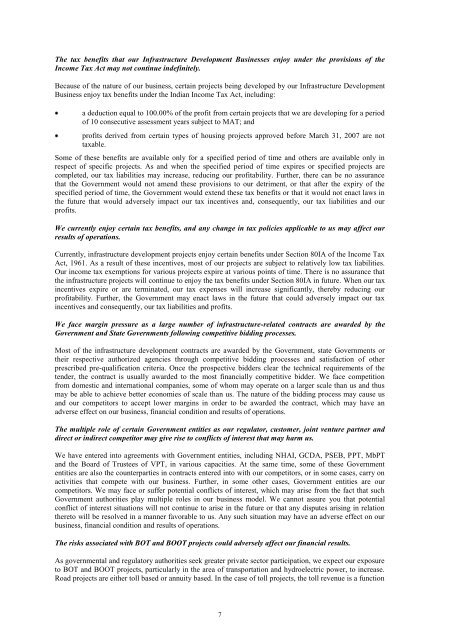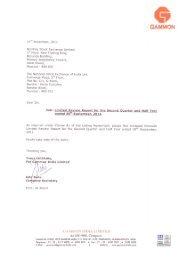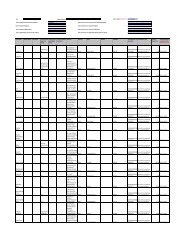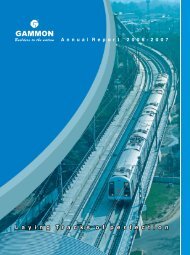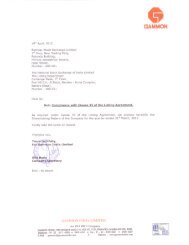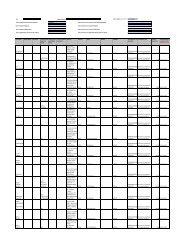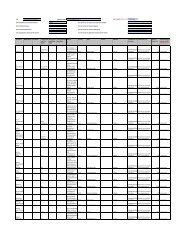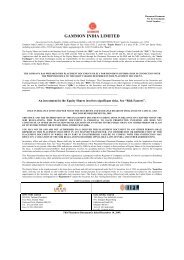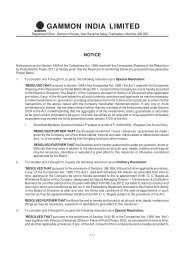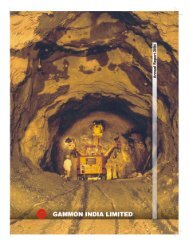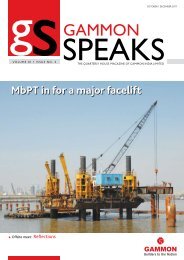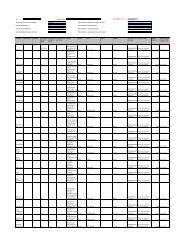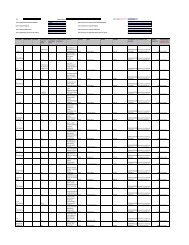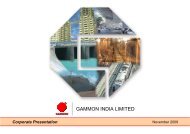GAMMON INDIA LIMITED
GAMMON INDIA LIMITED
GAMMON INDIA LIMITED
You also want an ePaper? Increase the reach of your titles
YUMPU automatically turns print PDFs into web optimized ePapers that Google loves.
The tax benefits that our Infrastructure Development Businesses enjoy under the provisions of the<br />
Income Tax Act may not continue indefinitely.<br />
Because of the nature of our business, certain projects being developed by our Infrastructure Development<br />
Business enjoy tax benefits under the Indian Income Tax Act, including:<br />
a deduction equal to 100.00% of the profit from certain projects that we are developing for a period<br />
of 10 consecutive assessment years subject to MAT; and<br />
profits derived from certain types of housing projects approved before March 31, 2007 are not<br />
taxable.<br />
Some of these benefits are available only for a specified period of time and others are available only in<br />
respect of specific projects. As and when the specified period of time expires or specified projects are<br />
completed, our tax liabilities may increase, reducing our profitability. Further, there can be no assurance<br />
that the Government would not amend these provisions to our detriment, or that after the expiry of the<br />
specified period of time, the Government would extend these tax benefits or that it would not enact laws in<br />
the future that would adversely impact our tax incentives and, consequently, our tax liabilities and our<br />
profits.<br />
We currently enjoy certain tax benefits, and any change in tax policies applicable to us may affect our<br />
results of operations.<br />
Currently, infrastructure development projects enjoy certain benefits under Section 80IA of the Income Tax<br />
Act, 1961. As a result of these incentives, most of our projects are subject to relatively low tax liabilities.<br />
Our income tax exemptions for various projects expire at various points of time. There is no assurance that<br />
the infrastructure projects will continue to enjoy the tax benefits under Section 80IA in future. When our tax<br />
incentives expire or are terminated, our tax expenses will increase significantly, thereby reducing our<br />
profitability. Further, the Government may enact laws in the future that could adversely impact our tax<br />
incentives and consequently, our tax liabilities and profits.<br />
We face margin pressure as a large number of infrastructure-related contracts are awarded by the<br />
Government and State Governments following competitive bidding processes.<br />
Most of the infrastructure development contracts are awarded by the Government, state Governments or<br />
their respective authorized agencies through competitive bidding processes and satisfaction of other<br />
prescribed pre-qualification criteria. Once the prospective bidders clear the technical requirements of the<br />
tender, the contract is usually awarded to the most financially competitive bidder. We face competition<br />
from domestic and international companies, some of whom may operate on a larger scale than us and thus<br />
may be able to achieve better economies of scale than us. The nature of the bidding process may cause us<br />
and our competitors to accept lower margins in order to be awarded the contract, which may have an<br />
adverse effect on our business, financial condition and results of operations.<br />
The multiple role of certain Government entities as our regulator, customer, joint venture partner and<br />
direct or indirect competitor may give rise to conflicts of interest that may harm us.<br />
We have entered into agreements with Government entities, including NHAI, GCDA, PSEB, PPT, MbPT<br />
and the Board of Trustees of VPT, in various capacities. At the same time, some of these Government<br />
entities are also the counterparties in contracts entered into with our competitors, or in some cases, carry on<br />
activities that compete with our business. Further, in some other cases, Government entities are our<br />
competitors. We may face or suffer potential conflicts of interest, which may arise from the fact that such<br />
Government authorities play multiple roles in our business model. We cannot assure you that potential<br />
conflict of interest situations will not continue to arise in the future or that any disputes arising in relation<br />
thereto will be resolved in a manner favorable to us. Any such situation may have an adverse effect on our<br />
business, financial condition and results of operations.<br />
The risks associated with BOT and BOOT projects could adversely affect our financial results.<br />
As governmental and regulatory authorities seek greater private sector participation, we expect our exposure<br />
to BOT and BOOT projects, particularly in the area of transportation and hydroelectric power, to increase.<br />
Road projects are either toll based or annuity based. In the case of toll projects, the toll revenue is a function<br />
7


